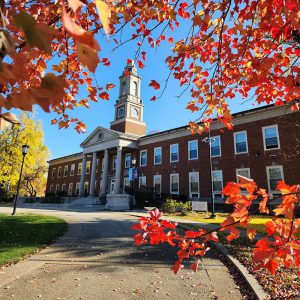This week, PTS will celebrate its 228th Commencement (congratulations to the graduates!). Each year, the students of the chapel team, led by the Rev. Kendra Buckwalter Smith ’12/’13, director of the Seminary’s Worship Program, design a final chapel service before saying goodbye to PTS—the “Service of Thanksgiving”—to mark the transition out of seminary and to reflect with gratitude on the growth, learning, connection, and formation that have happened during the previous chapter of life. This year, the team has chosen to focus on the theme of community—specifically, the way in which community is an aspect of call. Sometimes, these worship leaders attest, “we cannot do ministry without the support of others. Sometimes, we’ll lack the resources needed to do what we’re called to do; thus, part of our call is to rely on others.”
Some may chafe at the idea that relying on others, even to do our work and to fulfill our vocations, is not something that we need to “grow out of.” Often, the image of strength, of competency, or of “having one’s life together” comes part and parcel with the notion of independence. However, some contemporary thinkers, ministers, practitioners, and theologians are pushing back on the idealization of independence and instead considering interdependence as the state in which individuals and communities not only can flourish, but actually find themselves. In this week’s blog post, Dr. Daniel Frayer-Griggs, interim director of the Center for Writing and Learning Support at Pittsburgh Theological Seminary, reflects on one such poem by Willie J. Jennings and notes that Jennings’ idea of “a deeper reality of entanglement” resonates with one of the oldest Christological affirmations in the New Testament.
– Sarah Betzig ’21, Communications Strategist at Pittsburgh Theological Seminary
The Myth of Self-Sufficiency
In his challenging book After Whiteness: An Education in Belonging, Willie Jennings blends his analysis of the current state of theological education with some of his own poetic compositions. I invite you to reflect with me on one of his untitled poems:
Could self-sufficiency
be redeemed?
But who would want
such a thing?
Certainly not one who asked
Mary for life, or one
who needed friends along
the way of discipleship, or
one who called on an Abba-God, or
one who fell onto God’s Spirit
like a limp body
in need of support just to
face the morning sun
or one who said, “This is my body and my blood,
eat me
because you need me in you.”
Certainly not one who on a cross
killed the illusion of
self-sufficiency.
Throughout his work, Jennings invites us to imagine how theological education might look different—non-authoritarian, anti-assimilationist, and as this poem suggests, less enamored by the myth of self-sufficiency. The alternative Jennings envisions is one of authentic belonging marked by mutual transformation and a recognition of our interdependence, or what he elsewhere calls “a deeper reality of entanglement.”
Entanglement Incarnated
While Jennings’s poem is untitled, “A Deeper Reality of Entanglement” could easily serve as its title.
I am struck by the way he describes this “entanglement”—not as an idea or an ideal, not as a theory, but as a deep reality. And if this entanglement is a reality, it is our presumptions of self-sufficiency that are the illusion.
More importantly, the poem suggests, this notion of entanglement is incarnational. It is modeled on the life of the one who:
though he existed in the form of God,
did not regard equality with God
as something to be grasped,
but emptied himself,
taking the form of a slave,
assuming human likeness.
And being found in appearance as a human,
he humbled himself
and became obedient to the point of death—
even death on a cross.
Therefore God exalted him even more highly
and gave him the name
that is above every other name,
so that at the name given to Jesus
every knee should bend,
in heaven and on earth and under the earth,
and every tongue should confess
that Jesus Christ is Lord,
to the glory of God the Father.
(Philippians 2:6-11, NRSVUE)
Jesus became one with us so that we might become one with him, illustrating the deeper reality of God’s entanglement with our world: how the Word became flesh and dwelt among us.
As we go about our work, may we remember how our mission is entangled with our neighborhood, our city, and our world. By Christ’s example, may we recognize the reality of our entanglement with one another and the deep reality of God’s entanglement with us and with the world.
 Dr. Daniel Frayer-Griggs is interim director of the Center for Writing and Learning Support at Pittsburgh Theological Seminary. He holds a Ph.D. in New Testament from Durham University and additional degrees in education (M.Ed., Aquinas College), English (M.A., McNeese State University; B.A., Hope College), and theology (M.A., Pittsburgh Theological Seminary; B.A., Hope College). Dr. Frayer-Griggs is the author of Saved Through Fire: The Fiery Ordeal in New Testament Eschatology (Pickwick, 2016), is co-editor of “To Recover What Has Been Lost”: Essays on Eschatology, Intertextuality, and Reception History in Honor of Dale C. Allison Jr. (Brill, 2020), and has published articles in Harvard Theological Review, Journal of Biblical Literature, Journal for the Study of the Historical Jesus, and New Testament Studies. He has taught in local church communities and contributed lessons to The Presbyterian Outlook. He is an ordained elder in the Presbyterian Church (U.S.A.).
Dr. Daniel Frayer-Griggs is interim director of the Center for Writing and Learning Support at Pittsburgh Theological Seminary. He holds a Ph.D. in New Testament from Durham University and additional degrees in education (M.Ed., Aquinas College), English (M.A., McNeese State University; B.A., Hope College), and theology (M.A., Pittsburgh Theological Seminary; B.A., Hope College). Dr. Frayer-Griggs is the author of Saved Through Fire: The Fiery Ordeal in New Testament Eschatology (Pickwick, 2016), is co-editor of “To Recover What Has Been Lost”: Essays on Eschatology, Intertextuality, and Reception History in Honor of Dale C. Allison Jr. (Brill, 2020), and has published articles in Harvard Theological Review, Journal of Biblical Literature, Journal for the Study of the Historical Jesus, and New Testament Studies. He has taught in local church communities and contributed lessons to The Presbyterian Outlook. He is an ordained elder in the Presbyterian Church (U.S.A.).
Read Next



